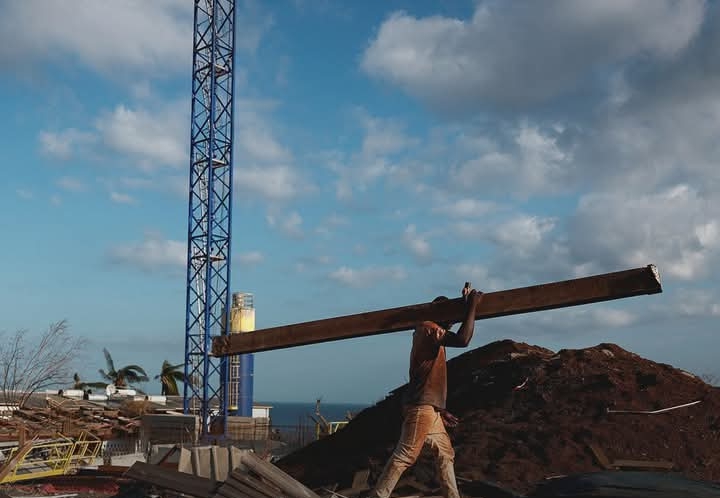By Adeyemi Adekunle
Mayotte, a French overseas territory in the Indian Ocean, stands at the precipice of another catastrophe as authorities prepare to issue a red alert late Saturday. Tropical storm Dikeledi is expected to unleash fierce winds and torrential rains, barely a month after Cyclone Chido left the region reeling from its deadliest storm in 90 years.
With scars still fresh from Chido’s wrath, which claimed at least 39 lives and injured thousands, the island’s residents face the harrowing prospect of reliving the nightmare. For the 310,000 inhabitants of Mayotte, one of France’s poorest departments, resilience is no longer just a necessity—it has become a way of life.
Rising Fear Amid Recovery
In the village of Koungou, 32-year-old Amina Mamoud struggles to rebuild her life. Her home was among the hundreds flattened by Cyclone Chido. “We haven’t even finished burying our dead, and now we have to prepare for another disaster,” Amina laments, cradling her infant son as neighbors help secure their fragile shelter. “The orange alert brought panic back into our lives. How do we survive this time?”
The cyclone alert system progressed from orange, warning residents to stock up on essentials, to the imminent red alert, asking people to stay indoors and cut off power supplies to minimize risk. For communities still reeling from Chido, the directive feels like déjà vu—only worse.
Officials Plead for Preparedness
Overseas Minister Manuel Valls has emphasized the importance of caution as the storm looms. “Given the state of Mayotte after the passage of Cyclone Chido, we cannot afford complacency,” Valls told BFM TV on Saturday.
Mayotte’s prefecture, working closely with emergency responders, braces for the dual challenge of protecting residents and averting widespread infrastructure collapse. Bridges damaged by Chido remain unrepaired, and water scarcity persists in many areas, threatening efforts to weather Dikeledi’s impact.
A Humanitarian Crisis
The lingering wounds of Chido have exacerbated pre-existing issues of poverty, overcrowding, and poor infrastructure. Temporary shelters across Mayotte remain overwhelmed, housing displaced families struggling to secure basic needs. Local health officials warn of rising cases of waterborne illnesses due to contaminated water sources, exacerbating fears of a full-scale humanitarian crisis.
The persistent power outages have also devastated businesses, leaving many without a livelihood. Thirty-nine-year-old fisherman Hassan Abdallah recounts how Chido destroyed his small fishing boat, cutting off his family’s primary source of income. “I rely on the ocean to feed my family, but now the ocean is my enemy,” he says, scanning the horizon for signs of the storm.
Environment and Climate Advocacy
Scientists and environmentalists point to climate change as a contributing factor to Mayotte’s escalating vulnerability. Rising sea temperatures have intensified tropical storms, making cyclones like Chido and Dikeledi deadlier.
Emma Rakoto, a climate researcher based in Madagascar, highlights the cycle of vulnerability. “Poorer communities like Mayotte bear the brunt of climate change because they lack the resources for robust infrastructure or disaster preparedness. This storm is a grim reminder of the inequalities inherent in global warming,” Rakoto explains.
Hope in the Face of Despair
Despite the looming danger, the people of Mayotte are rallying together. Local leaders, nonprofits, and international aid agencies are working tirelessly to prepare communities for the impending storm. Volunteers in Sada have organized makeshift supply centers, distributing food, blankets, and essential medicines.
One young volunteer, 17-year-old Mariam Anzari, speaks of her motivation. “We cannot stop the storm, but we can help each other survive it. Chido showed us how strong we are together.”
The Calm Before the Storm
As Dikeledi closes in, there is an eerie stillness across Mayotte, broken only by the hammering of nails and the chatter of communities fortifying their homes. Residents wait anxiously for the storm’s arrival, uncertain of what destruction it may bring but resolved to face it together.
While the imminent red alert serves as a grim warning of nature’s fury, it also underscores the unyielding spirit of Mayotte’s people. For them, survival is not just a necessity—it is a testament to their resilience in the face of relentless adversity.




